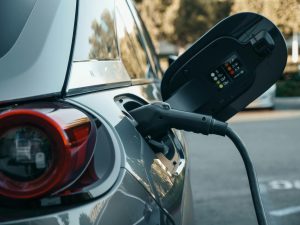Suffolk County Council has secured millions of pounds of funding to help develop electric vehicle (EV) charging across the county.
The county council has been allocated the money after successful bids to the Government’s Local Electric Vehicle Infrastructure (LEVI) fund, which supports local authorities to plan and deliver charging infrastructure for residents without off-street parking.
Suffolk residents without off-street parking will benefit from £5.9 million to support EV charging, and a further £1.4 million will be used to develop the county’s existing EV charging network in community locations.
Homes without a driveway face challenges when it comes to charging an EV – in some cases it is just not possible, and it is unsafe and hazardous to run cables across pavements. Along with inconvenient access to public charging, these are common reasons that people give for not choosing an EV.
However, the funding will start to provide solutions to some of these issues, with opportunities to develop:
- kerbside charging points
- community charging hubs
- car park charging points
- fast and rapid charging point infrastructure improvements
Suffolk residents are invited to ‘nominate’ their street for consideration for on-street charging points, using this online form. Although not every road may be suitable, suggestions from residents will help indicate where there is demand for charging points.
Councillor Richard Rout, Suffolk County Council’s Deputy Leader and Cabinet Member for Finance and Environment, said:
“The recent EV:Ready Report, which the county council commissioned on behalf of all local authorities in Suffolk, suggests a need for 2,000 standard chargers and 40 to 60 rapid charging stations in Suffolk by 2030, to meet the demand of the EV transition.
“The LEVI funding will enable the council to play its part in moving Suffolk closer to those numbers, building on all our EV achievements so far – for example, the county council has been working on the county’s EV charging infrastructure since 2018 when we launched the Plug In Suffolk project.
“Supporting Suffolk’s residents, businesses and visitors to move to EVs goes beyond just using less petrol and diesel. It’s about improving Suffolk’s air quality and enabling us to live healthier lives, and reducing the impacts of climate change which have once again been brought into sharp focus by the many storms and flooding events we’ve seen in recent months.”
Technology and Decarbonisation Minister Anthony Browne, said:
“This Government has a plan to help speed up the installation of EV chargepoints, which we’re getting on and delivering.
This dedicated funding to local councils is part of our plan to ensure people can switch from a petrol or diesel car to an EV when they choose to do so.”
This investment continues the council’s contribution to the Suffolk Climate Emergency Plan, which identifies that the decarbonisation of vehicles in Suffolk is a key aspect of meeting the net zero by 2030 target for the county.
Complementing the new funding, is Suffolk County Council’s recently published Suffolk Electric Vehicle Charging Infrastructure Strategy. It has been written with the input of all borough and district councils, aiming to improve the EV charging experience for drivers in Suffolk.
Cllr Rout continues:
“The Strategy gives us a clear picture of what Suffolk has achieved already, but importantly shows where we must focus our efforts to further support Suffolk’s residents, businesses and visitors.
We of course promote walking, cycling and using public transport where possible, but for the vehicles that remain on our roads, we want to encourage the transition to EVs. It is an important culture to embrace, as it positively impacts so much from climate change, to our health, to our local tourism economy.
Both the Strategy and the successful funding bids are an indication of the county council’s continuing commitment to encouraging EV use and our drive to net zero by 2030.”






